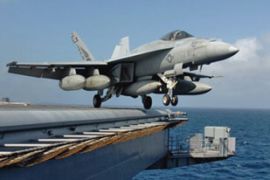US refuses to confirm Somalia raids
Some Somali officials say there have been more air strikes since Monday’s operation.

Published On 11 Jan 2007
The Pentagon confirmed that US forces carried out attacks on Monday, the first overt US military action in Somalia since 1994, as part of a wider offensive involving Ethiopian aircraft.
Officials said Monday’s strike was aimed at a suspected al-Qaeda cell and Fazul Abdullah Mohammed, a man wanted by the FBI in connection with the bombings of US embassies in Africa in 1998, was reported to have been killed in the attack.
The US involvement has provoked international criticism, but the US defended its actions.
A defence spokesman said: “We have a concern that those terrorist elements operating in Somalia not be allowed to flee.”
Conflicting reports
Abdirizak Hassan, the Somali president’s chief of staff, was reported on Wednesday as saying that at least three US air strikes had been carried out since Monday and one government source said four new US strikes hit areas around Ras Kamboni, close to the Kenyan border.
| Your Views |
|
“Somalia supports the goverment’s vision and its values” Liban, Galkio, Somalia |
But the Pentagon has acknowledged only Monday’s attack, contradiciting Somali government claims.
Some sources have suggested that Ethiopia conducted the additional attacks.
The US aircraft carrier USS Eisenhower, from which raids by fixed-wing fighters may be called, continues to be positioned off Somalia’s coast.
Single air strike
Al Jazeera on Wednesday quoted Meles Zenawi, the Ethiopian prime minister, as saying that US warplanes launched a single air strike over south Somalia, killing eight people with suspected al-Qaeda links and arresting five others.
For his part, Hussein Aideed, the deputy prime minister, called for the intervention of US ground forces to hunt those linked to al-Qaeda in Somalia.
Meanwhile, the UN Security Council is making necessary arrangements to discuss the situation in Somalia, including the proposal to send an African peacekeeping force to replace Ethiopian forces.
Discussions
In Mogadishu, Abdullahi Yusif, the Somali president, held discussions with Abdul Qasim Salad, a former president, that touched on ways of restoring peace and security to the capital, and on promises given by African and Arab leaders to contribute peacekeeping troops, Al Jazeera said.
In another development former Somali local commanders who returned to Baidoa after entering into an agreement with the government, have called for opening the door for political activity and for establishing political parties, Al Jazeera said.
The commanders controlled large swathes of Somalia after the civil war in 1991, but were forced out of Mogadishu and other towns by the Council of Islamic Courts.
Source: News Agencies